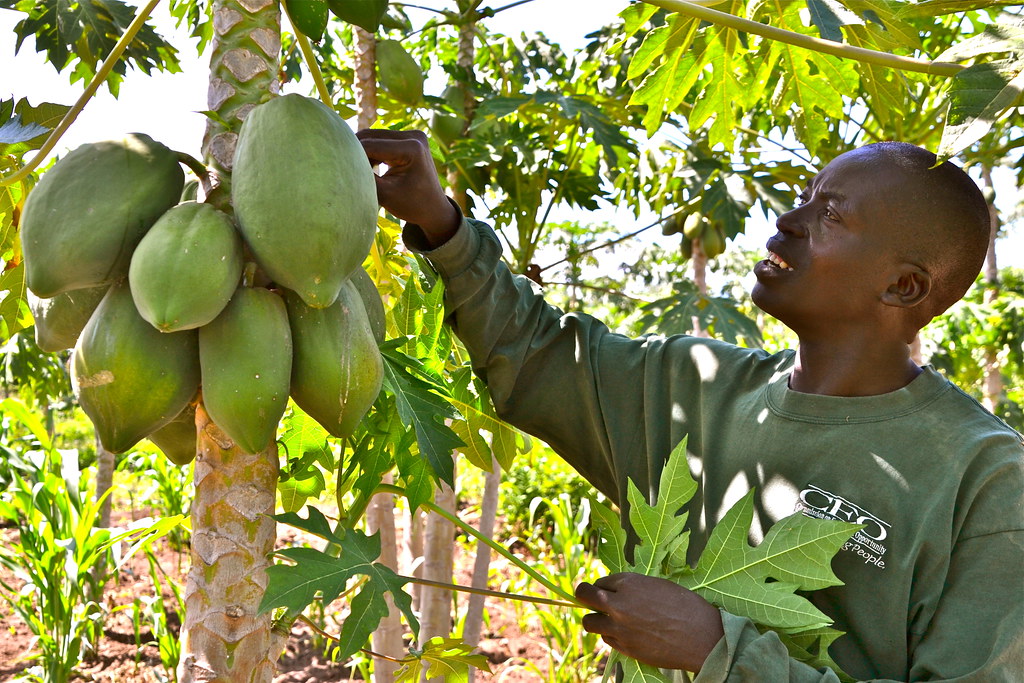上週的第二次非洲氣候智慧農業聯盟論壇上,超過45國政府、公民社會、商業代表和多邊、雙邊夥伴達成共識,宣示要在2025年前建立氣候變遷適應能力,培養2500萬氣候智慧農民。
這次論壇由非洲新夥伴發展計畫(New Partnership for African Development,NEPAD)、性別氣候變遷與農業子計畫(Gender Climate Change and Agriculture Programme)和肯亞政府共同召集,11至13日在肯亞奈洛比進行,主題是「從協議到行動:實踐非洲國家自主決定預期貢獻(INDC)與成長」。
國家自主減碳目標 2500萬氣候智慧農民來達成
INDC是巴黎氣候協議之下世界各國自主提出的減碳承諾,將於今年11月4日生效。
從自主決定預期貢獻轉型至自主決定貢獻(Nationally Determined Contributions,NDCs),對非洲的發展具有關鍵性的影響,尤其在農業方面。NDCs將成為世界第一個一體適用於已開發和開發中國家的減排目標。
2014年6月在赤道幾內亞舉行的非洲聯盟高峰會上,與會各國政府接受一系列具體的2025年農業目標。這些目標更加聚焦於達成財富共享和改善民生,其中最關鍵的目標是在2025年前培養2500萬氣候智慧農民。
農業是消除貧窮的關鍵 非洲各國轉型永續生產
在第二次非洲氣候智慧農業聯盟論壇上,與會代表重申強化與穩固氣候智慧農業知識庫、技術、實務和倡議的重要性。
與會代表認為,農業是非洲經濟成長和消滅貧窮的關鍵政策倡議,是非洲發展的重要議題,與「2063議程」(Agenda 2063)的願景和目標一致。
氣候智慧型農業將增加永續農業產量、形塑永續糧食系統以及從微觀到鉅觀的社會與環境適應能力。
十年解決資訊斷層 從教育、社區著手
在論壇上,非洲國家清楚意識到氣候變遷對農業的負面影響,但是意識和行動之間仍存在著斷層。
與會代表表示,斷層來自缺乏考量氣候變遷議題的規劃和政策、缺乏教育、社區之間缺乏聯繫、資訊未能流通至需要的人手上、缺乏行動的制度框架、耐旱作物品種不足以及小農缺少水源。
這些問題都是非洲國家要達成2025年2500萬氣候智慧農民目標的障礙——距離現在剩不到10年。
專家:原民知識分享是轉型關鍵
與會代表提倡傳播氣候智慧型農業成功故事,並獎勵農民採用相同永續方法,這時小農面臨的困境一一浮上討論檯面。
NEPAD方案執行和協調主任Estherine Fotabong強調,知識分享是農業與偏鄉轉型的關鍵,其中原民知識更應結合科學研究發現加以應用。
聯合國糧農組織非洲區域代表Abebe Haile Gabriel強調,非洲各國在達成INDCs的過程中需要支持,而氣候智慧型農業對許多非洲國家而言是達成INDCs的重要條件。
為促進氣候智慧型農業發展,NEPAD和五個與社區密切合作的非政府國際組織組成聯盟,包括天主教救濟服務、Concern、CARE、世界展望會和樂施會,作為深入非洲大陸的觸角,確保農民獲得轉型智慧型農業所需要的資源。
African delegates from more than 45 countries have welcomed progress made by the New Partnership for African Development, NEPAD, Gender Climate Change and Agriculture Programme, established to foster resilience among farmers to the shocks of climate change.
Government and civil society representatives, delegates from private sector and farmer organizations, and regional economic communities, as well as multilateral and bilateral partners gathered for the second Africa Climate Smart Agriculture Alliance Forum at the Safari Park Hotel in Nairobi, October 11-13.
Convened by the NEPAD Agency and the Government of Kenya, it was held under the theme “From agreement to action: implementing African Intended Nationally Determined Contributions (INDC) for growth.”
The INDCs are initial pledges made by nearly all countries under the Paris climate agreement, adopted in December 2015, which is set to enter into force on November 4.
The transition from INDCs to Nationally Determined Contributions, NDCs, has key implications for Africa’s development, especially agriculture.
The NDCs will become the world’s first greenhouse gas reduction targets that apply equally to both developed and developing countries.
At the African Union Summit in Malabo, Equatorial Guinea in June 2014, Heads of State and Government adopted a set of concrete agriculture goals to be attained by 2025. This set of new goals shows a more targeted approach to achieving shared prosperity and improved livelihoods.
The key goal is to establish 25 million climate smart farmers by 2025.
In Nairobi last week, delegates to the Africa Climate Smart Agriculture Alliance Forum reiterated the need to strengthen and consolidate the knowledge base of climate smart agriculture, CSA, technologies, practices and initiatives.
They confirmed that agriculture should remain high on Africa’s development agenda as a critical policy initiative for African economic growth and poverty reduction.
This supports the aspirations and goals in Africa’s Agenda 2063.
Climate smart agriculture will shape enhanced and sustainable agricultural productivity, sustainable food systems as well as broad-based social and environmental resilience from household through to landscape level.
During the Forum it become apparent that African countries are acutely aware of the negative impacts of climate change on agriculture. Yet, gaps and disconnects still exist between awareness of impacts and adaptation efforts.
Delegates mentioned gaps such as the absence of plans and policies that incorporate climate change issues, lack of education and outreach among communities, and information that fails to reach intended beneficiaries.
Also lacking are institutional frameworks for action, drought resistant crop varieties, and smallholder water harvesting.
These barriers are challenging as Africa endeavors to meet the target of 25 million farmers practicing climate smart agriculture come the year 2025 – less than 10 years away.
The difficulties of smallholder farmers were brought into focus with a call to promote climate smart agriculture success stories and award other farmers opportunities to adopt such sustainable innovations.
Estherine Fotabong, NEPAD’s director of programme implementation and coordination, stressed that knowledge sharing is key to agricultural and rural transformation, through which indigenous knowledge should not be ignored but used as synergy with scientific findings.
Abebe Haile Gabriel, the UN Food and Agriculture Organization’s deputy regional representative for Africa, maintained that countries need support to achieve their Intended Nationally Determined Contributions to the Paris Climate Agreement.
Through the effort to meet their INDC, the importance of climate smart agriculture comes to the fore for many African countries.
As part of synergy building to ensure more is done to enable climate smart agriculture, NEPAD has entered into alliance with five international nongovernmental organizations that work through communities and community-based groups.
The NEPAD-NGO Agriculture Climate Change Alliance involves: Catholic Relief Services, Concern, CARE, World Vision and Oxfam.
The Alliance aims to increase its presence across the African continent to ensure that better coping mechanisms reach farmers to support their resilience in the face of climate shocks such as droughts and floods.
※ 全文及圖片詳見:ENS






